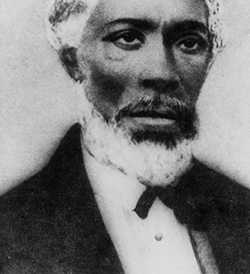Intro
For more than 177 years, Ys have adapted to meet the changing needs of the communities we serve. The Y has been a strong advocate for systems change, bridging social divides and tackling challenges at home and in communities in 120 countries. We are action-oriented, optimistic and determined, and our history will continue to inform our future as we seek to reach new generations of young people, including boys and young men of color.

Founding Focus
In 1844, the YMCA’s founder, George Williams, focused on improving the spiritual and economic conditions for boys and young men in what was considered a turbulent time in London, England. In 1851, Captain Thomas Sullivan had a chance to observe the YMCA at work in London and put the same focus and intention into starting the U.S.’s first YMCA in Boston, Massachusetts. In 1853, Anthony Bowen, who had once been enslaved, was compelled by observing those same needs in Washington, D.C. and founded a YMCA for Black boys and young men.
Reigniting a Focus
In 2018, economist Raj Chetty and census researchers Maggie R. Jones and Sonya R. Porter launched a study that illustrated the widening gap in economic mobility between Black and white men in the U.S., highlighting the importance of focusing on opportunities and outcomes for Black and Brown boys. In response to these findings, the Y’s African American CEOs Network sparked the idea for the Y to adopt a formal national strategy to position boys and young men of color to reach their full potential. With the support of Kevin Washington, the first Black President and CEO of YMCA of the USA (2015-2021), the Y’s Boys and Young Men of Color (BYMOC) strategy was established in 2018.
To build and invest in pathways to success that inspire and transform personal identities so that boys of color reach their full potential
body
Why We Focus on Boys and Young Men of Color
High school graduation, incarceration and poverty rates illustrate unacceptable disparities between boys and young men of color and their white counterparts. The study also found gaps in workforce participation, health and well-being, and life expectancy. These disparities are detrimental not only to boys and young men of color, but to their families and communities. I do believe the Y can play a fundamental role in addressing these issues and, at the same time, address our own challenges with boys and young men of color since they are vastly under-represented among Y members, program participants and staff.
Since the launch of the initiative in 2018, a cohort of Ys in 26 cities and 16 states have been serving more than 1,400 boys and young men of color. Because the COVID-19 pandemic has exacerbated so many inequities, many youth-serving organizations, including schools, are faced with the growing need to align school participation with workforce development, which means that doubling down on our focus on boys and young men of color is even more critical.
The Call to Action
By 2024, our goal is to collaborate with national and local organizations to serve more than 10,000 boys and young men of color throughout 100 cities, focusing on reducing school truancy and chronic absenteeism, improving graduation rates and helping them establish career pathways to ensure their economic mobility. Because the Y has a presence in 10,000 communities across the U.S., we are on the ground, we are proximate and we can utilize that proximity to increase economic well-being for neighborhoods and cities by improving outcomes for boys and young men of color.
2024 Goals for Boys and Young Men of Color:
- 70% will have access to high quality, nurturing and more culturally responsive learning environments
- 75% will have stabilized and improved grades by reducing school suspensions, improving attendance
- 100% will have completed assessments for social/emotional learning
- 75% will have increased access to high quality post-secondary and career-ready pathways
- Social justice policies will have improved through working with national and local partners to lower law enforcement encounters and identify well-being measures locally and nationally
As we’re confronted with the triple threat of civic unrest, a global pandemic and increasing economic disparities, our 177-year history is our best evidence that the Y can continue to be a strong advocate for systems change, build more bridges to close the social divides and tackle some of the toughest challenges of our time. Transformational service is in our DNA, and I believe our emerging leaders on the frontlines can elevate the voices of our boys and young men and, together, be a force for change. In fact, history—in this case, our Black and Brown history, says “Yes, we can and yes, we should.”





